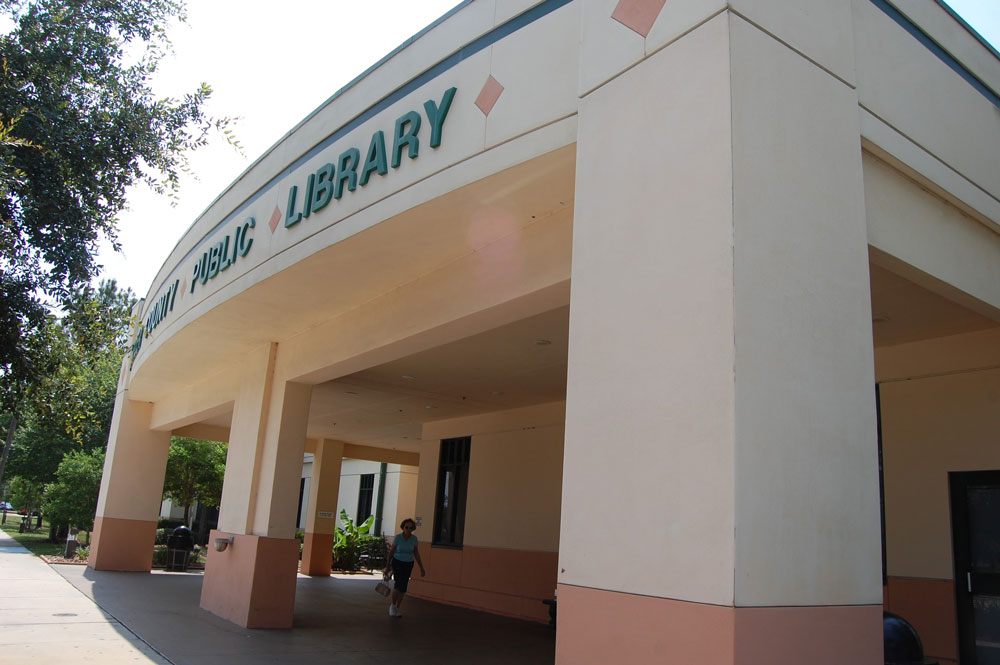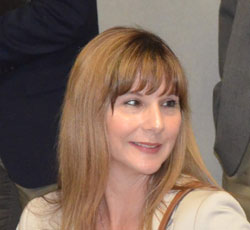
Thanks to Flagler County Public Library Director Holly Albanese and her staff of more than a dozen, the libraries on Palm Coast Parkway and in Bunnell continued to operate even after shutting their doors to the public in mid-March as a result of the coronavirus emergency, doing brisk business with curbside service. Patrons took to looking up their needs online, phoning them in, and picking up their materials at the library door, and the library found a new way to fill an important need at a time of very limited or non-existent social, cultural and entertainment activities beyond people’s own homes.
The library was checking out almost 900 items a day, taking 600 drop-offs a day, and seeing some 200 holds placed on materials each day by patrons. That’s half the normal activity, when the library is open, but still a considerable amount, given the limitations, and a reflection of how quickly both the library staff adapted and patrons’ needs found a still-willing outlet.
All that came to an end Tuesday, at least at the Palm Coast branch, as three of Albanese’s 16 staffers developed Covid-19-like symptoms. The county stopped all services, the three staffers were tested for Covid-19, as were possibly some of their contacts through the Department of Health’s contact tracing (to determine the extent of their interactions and, thereby, potential additional infections), and they were required to self-isolate for 14 days. Not all employees were working at the Palm Coast or Bunnell branch: Two of the library system’s employees had been assigned to the county office to help out with other duties there.

In the early days of the pandemic in Florida, the virus was often traced to an explicable origin such as recent travel to Asia or Italy, or vacation on a cruise. But in more recent days, so-called “community spread” has been more prevalent, and more concerning to public health officials, because once community spread begins, it is much more difficult to contain unless residents respect strict social distancing rules. Even then, because the virus is new and not yet fully understood, how it spreads is not always known, especially as more recent research points to a lot of potential spread through asymptomatic carriers.
Flagler County as of midday today had 17 confirmed cases of Covid-19, with just 200 tests taken. Florida had 6,338 cases, with 61,000 tests taken, and 77 deaths attributed to the disease.
All local governments have closed their buildings to the public, restricting access to essential workers and services, though at most levels of government, the public has continued to have access to services through curbsides. That’s been the case at the Government Services Building in Bunnell, where the tax collector, the property appraiser, the elections supervisor and the county administration have continued to provide customer service in various ways, encouraging residents to call first to learn whether the service they need must be carried out immediately, or whether it can wait.
The Bunnell branch of the public library will continue to operate on a curbside-service status, Albanese said, since the employee there has not had contact with any of the employees at the Palm Coast branch. The Palm Coast branch is shut down “until further notice.”
But even then, it’s not actually completely shut down. Albanese had just secured a new service for the library called Hoopla, whose tagline is: “Your public library at your fingertips. Anytime. Anywhere.” And so it is: patrons with a library card and a pin number may still access library resources, whether to read books, listen to audio books or watch movies, in numbers possibly much higher than they had access to at the library itself. The level of service secured through the Flagler library will not give access to the newest titles and movies: that would have been too expensive at the moment. But it still opens up a vast library, with streaming capabilities.
For those who do not have a library card, they can still secure one by phone through the Bunnell branch (437-7390) during regular business hours.
Since the Palm Coast branch has closed, Albanese is asking all patrons to hold on to their library materials and not drop them off at the drop-off bin, which is not being serviced for now. All late fees are being waived, so there’s no danger of accuring any, and for many of those materials, auto-renewal may apply.
Albanese said that if the employees’ tests return all negative, it is possible the library will resume its curbside service. But it isn;t clear when the test results will be known.
Meanwhile, the Public Library Association, a division of the American Library Association, is holding a series of accessible online seminars on how libraries can adapt remote services to the Coviod-19 emergency. When the webinars are full, the recordings are subsequently available to watch, free of charge.





























Hammock Bear says
When I was in grade school in the 50’s our library in school shut down when Pink Eye , Measles, Chicken Pox and Mumps broke out. Library closings should have been first to Close. Hope Everyone stays healthy.
Lisa says
I am just curious, doesn’t Covid 19 virus live on cardboard for 3 days and longer on plastic and metal longer?
Jan says
Love our library and all associated with it.
Hoping everyone is okay, and thanks for all you do.
Earl says
Love my library! Hope the library workers are all safe and healthy! It was a great thing they were all doing to provide services for people through these tough times for many. Sharing knowledge and education is their job and the fact that they continued to work through this national emergency shows their dedication to us. They will surely be needed after all this is done and over.
WhackAMole says
How did they get it if they did? Obviously, it is in the community and is more widespread than the paltry testing indicates. Test more=find more. Pretty simple. Wish we could get a test. I can’t pay someone for one even on the black market. They just aren’t there.
B. Informed says
This was a memo from ALA:
The American Library Association (ALA) Executive Board released this statement March 17 in support of libraries and library workers during the COVID-19 pandemic:
The ALA Executive Board unequivocally stands in support of the safety and well-being of library workers and the communities we serve. To protect library workers and their communities from exposure to COVID-19 in these unprecedented times, we strongly recommend that academic, public, and school library leaders and their trustees and governing bodies evaluate closing libraries to the public and only reopening when guidance from public health officials indicates the risk from COVID-19 has significantly subsided.
It is very difficult for us to put forward this recommendation. Libraries pride themselves on being there during critical times for our communities. We are often the only institutions to remain open during times of crisis. Service and stewardship to our communities are core to our profession.
We have weighed the situation of our country and what has happened in other countries around the world. The health of our library workers and the communities we serve is of utmost and equal importance. Libraries are by design unable to practice social distancing to the degree recommended by the Centers for Disease Control and Prevention and other health authorities. Keeping libraries open at this time has the potential to harm communities more than help. We underscore the importance and need to come together in this crisis and commit to ensuring our libraries, which provide so many important services to our communities, do not serve as vectors for a fast-moving pandemic.
Libraries are responding creatively and proactively to this crisis. School libraries in many states have closed along with schools and many have plans to provide online classes to students. Public libraries are making virtual resources available and considering other ways they can help during the crisis. Academic libraries are providing online services and access to resources. All libraries are working with their school administrators, governments, boards, and university administrations to determine critical services and closures following local directives.
Sadly…no one read it or saw it.
Willy Boy says
Thanks Holly and Staff.
B. Informed says
Bunnell SHOULD NOT BE OPEN in any way shape or form. THESE people are NOT adhering to the ALA guidelines.
The Director is a member of the ALA (American Library Association) according to her Linked In, but yet she has put all who use the library, at risk for not following guidelines set forth by them.
FROM THE ALA:
Time is the best disinfectant
Yet stepping back may be the best defense against a still developing threat. The easiest, safest, and most inexpensive disinfectant is time. “This pandemic is a unique situation for most conservators, so we don’t know a lot about disinfecting generally, and this virus specifically,” says Knight. “Our view is that prophylaxis, or preventive measures, are best.”
Fletcher Durant, director of conservation and preservation at the University of Florida’s George A. Smathers Libraries, suggests that all libraries follow the March 17 ALA recommendation to close to the public. “Isolation for a minimum of 24 hours, and preferably 14 days, is the best disinfectant,” he says. “It is simply the best and safest thing that we as librarians can do at this time.” Durant says it’s about protecting libraries as well as the public. “Libraries could provide a risk vector for the spread of the disease, which, beyond the direct health impacts, could reduce the public trust in libraries,” he says.
That also means libraries should plan to stay closed until the risk of public infection is eliminated. “We would be the first to say that we are not equipped to make recommendations on virology, bacteriology, or medical matters,” says Nadal. “Quarantine past the viability of the virus is the best plan.”
Cleaning and sanitizing
Some libraries, however, have a mission that precludes complete quarantine. LC, for example, continues to support Congress while it’s in session, which requires some staff to be onsite. Other libraries are maintaining services with curbside checkouts of materials. That means additional sanitizing methods are warranted.
Internal hard surfaces, including tabletops, door handles, book drops, and computers, should be professionally cleaned. Experts also note that virtual reality headsets have been flagged as a risk factor, and libraries should postpone their use. “If at all possible, hire a professional cleaning service that has appropriate training and personal protective equipment to do this work,” says Nadal. “This is a time for exceptional caution.”
Any staff working onsite should institute thorough hand-washing, especially when handling books or any shared objects in the library. “There are no studies that specifically answer the question of how transmissible the coronavirus might be from the most common library materials, [such as] coated and uncoated paper, book cloth, or polyester book jackets,” Nadal says. “We have to look for high-quality information and evaluate it critically to determine how well it applies to our particular concerns.”
https://americanlibrariesmagazine.org/blogs/the-scoop/how-to-sanitize-collections-covid-19/